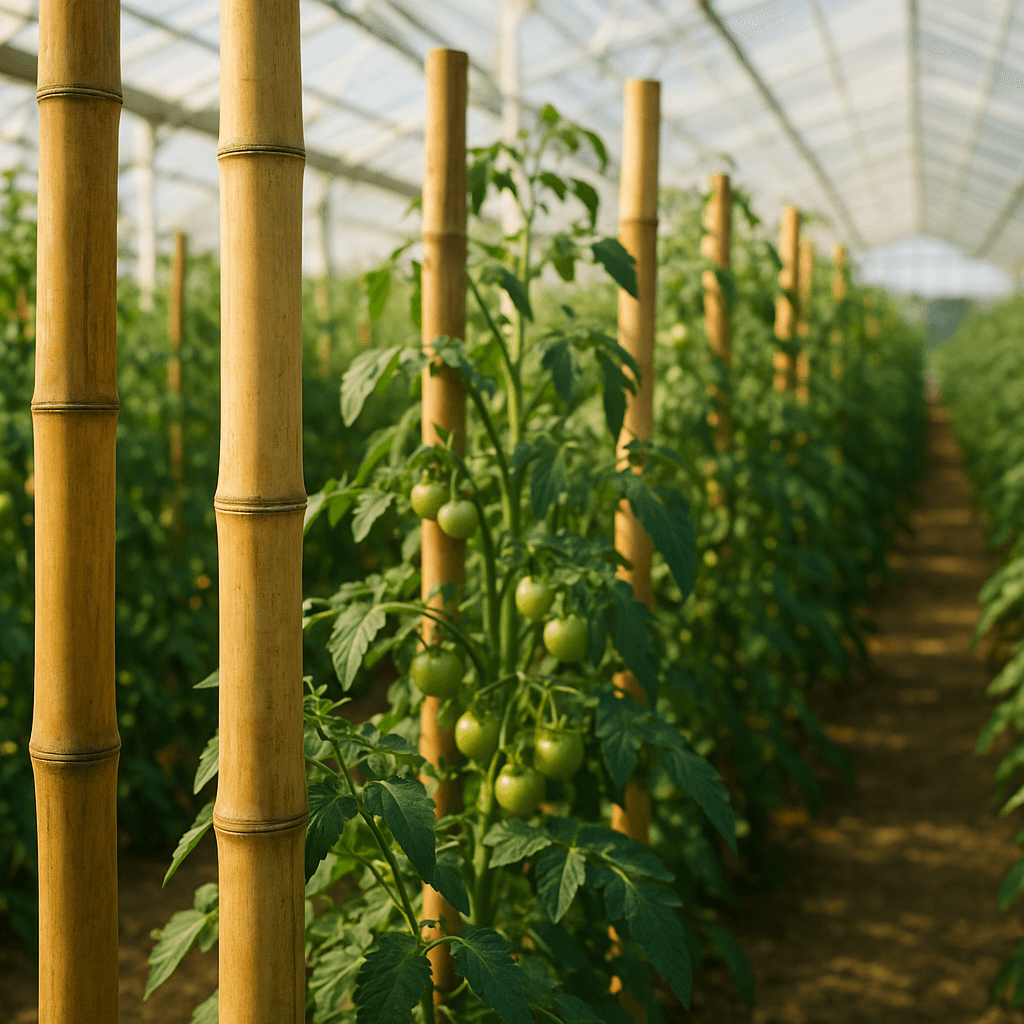Big Bamboo Stake Buying Guide: Size, Strength, and Savings
A single broken tomato truss or toppled orchard sapling can erase weeks of effort. That’s why commercial growers and weekend gardeners alike turn to the big bamboo stake—the heavyweight champion of natural plant supports. Thick‑walled culms offer impressive load‑bearing strength, while their warm, rustic look blends seamlessly into rows of tomatoes, peppers, vines, and young trees. At Wellco Wholesale, a one‑stop factory‑direct wholesaler of agricultural and landscaping supplies, pro customers order these stakes by the pallet, confident they’ll arrive straight from sustainably managed bamboo forests and pre‑sorted for uniform quality.

What Is a Big Bamboo Stake?
Diameter, Length & Internode Basics
-
Diameter: 18 – 30 mm is typical for “big” grades used with heavy crops or wind‑exposed beds.
-
Length: 1.8 m – 3 m lets you bury 25 % of the stake yet keep ample height for vertical training.
-
Internode spacing: Wide internodes (25 – 40 cm) signal mature culms with thicker walls and better compression strength.
Bamboo vs. Wood, Fiberglass & Steel
| Material | Avg. weight (g / m) | Flexural strength (MPa) | Notes |
|---|---|---|---|
| Moso bamboo | 600 | 130 | Renewable, biodegradable |
| Treated pine | 940 | 80 | Heavier, prone to splitting |
| Fiberglass rod | 750 | 110 | UV‑stable but costlier |
| Galvanized rebar | 1100 | 210 | Strong, rusty look in gardens |
Across typical diameter ranges, bamboo delivers 60 % more strength‑to‑weight vs. treated pine while costing up to 40 % less than fiberglass composites.
Matching Size & Strength to Your Plants
Assess Plant Height, Stem Thickness & Wind Load
-
Measure mature height. Tomatoes > 1.5 m need at least a 2.4 m stake.
-
Check stem diameter. Thick stems transfer more force—choose 22 mm+ diameters.
-
Know your wind zone. Coastal beds or exposed terraces should upgrade to culms with 5 mm wall thickness.
Sizing Chart by Crop
| Crop | Stake length | Diameter | Notes |
|---|---|---|---|
| Indeterminate tomatoes | 2.4 m | 22 – 28 mm | Pair stakes per plant in gusty areas |
| Bell peppers | 1.8 m | 18 – 22 mm | Push 40 cm into soil |
| Cucumber trellis | 3 m | 25 – 30 mm | Use as verticals + crossbars |
| Young fruit trees | 2.7 m | 25 – 30 mm | Guy‑line tie at ⅔ tree height |
Wall Thickness & Compression Strength Explained
Compression tests from Jiangsu Agricultural University show 5 mm‑wall bamboo withstands 38 kg load before buckling, outperforming similar‑sized pine stakes by 27 %. Quoting Dr. Xu Li, structural botanist:
“The hollow structure behaves like a natural I‑beam—mass stays where stress is highest, giving bamboo exceptional column strength at low weight.”
Cost, Lifespan & Real Savings
Price‑Per‑Stake vs. Bundle Economics
-
Retail garden center: $2.50 per 2 m stake
-
Bulk pallet (500 pcs) via Wellco Wholesale: $0.88 per stake
Buying a single pallet slashes unit cost 65 %, a quick win for market farmers or co‑ops.
Durability Factors & Reuse Cycles
A three‑year field trial in North Carolina recorded average stake lifespan of 4.6 seasons when growers stored culms indoors after harvest and applied lime‑sulfur dip the first year.
Lisa Ortiz, 15‑acre organic farmer: “I retired most stakes only after year five—still cheaper than a single roll of trellis netting replaced annually.”
Total Cost‑of‑Ownership Calculator Example
| Scenario | Stakes Needed | Years of Use | Total Cost | Cost / Year |
|---|---|---|---|---|
| Retail purchase | 600 | 2 | $1,500 | $750 |
| Pallet via Wellco | 600 | 4 | $528 | $132 |
Quality & Sourcing Checklist
Visual & Lab Tests for Grading Bamboo
-
Look for light, even coloration—sun‑bleached culms crack sooner.
-
Knock test: a crisp ring indicates dense walls.
-
Moisture < 15 % (ASTM D4444) resists fungal growth.
Supplier Vetting: Certificates, Sustainable Harvesting & Logistics
Reputable exporters provide:
-
Phytosanitary certificates
-
FSC or PEFC forest stewardship proof
-
Load plans outlining steel‑strapped bundles to minimize shipping damage
How Wellco Wholesale Streamlines Bulk Purchases
By aggregating orders across garden centers, Wellco negotiates container‑level freight rates and can deliver mixed‑product loads—stakes plus jute twine, shade cloth, or fiberglass angle trim—saving customers separate sourcing headaches.
Installation & Maintenance Best Practices
Pre‑Soaking & Point‑Shaping
-
Soak butt ends overnight to reduce splintering during pounding.
-
Shave a 30° tip with a carpentry chisel for smoother soil entry.
Secure Tying Methods
-
Figure‑eight tie—prevents stem chafe.
-
Slip knot—fast adjustment as plants grow.
-
Reusable clips—great for nursery standards.
Seasonal Care: Cleaning, Storage & End‑of‑Life Disposal
-
Spray stakes with 2 % hydrogen peroxide to sanitize.
-
Store on horizontal racks under roof airflow.
-
Chop exhausted culms into 5 cm rings for compost pile aeration.
Real‑World Results & Expert Insights
Case Study: Greenhouse Tomato Farm Cuts Breakage 40 %
A 0.6‑ha hydroponic tomato house in Ontario replaced 19 mm fiberglass rods with 25 mm big bamboo stakes. Stem breakage incidents fell from 18 % to 11 % over two seasons, while material costs dropped $2,300.
Pro Grower’s Tips for Maximizing Stake Lifespan
“Seal the top node with outdoor varnish—rainwater can’t pool, and I easily get four harvests per stake.”
—Rafael Mendes, specialty pepper producer, São Paulo
Conclusion
Big bamboo stakes deliver the rare mix of strength, sustainability, and savings that fast‑growing crops demand. Choose the right diameter, source graded culms, and follow smart maintenance to extend service life well beyond a single season. Ready to upgrade your plant supports? Contact Wellco Wholesale for rapid quotes, free sizing charts, and sample bundles.
Frequently Asked Questions
Q1. How thick should a big bamboo stake be for fruit trees?
Select 25 – 30 mm culms; the extra wall thickness counters trunk sway and lasts several seasons.
Q2. Can I cut bamboo stakes to size without splitting them?
Yes—wrap masking tape around the cut line, then use a fine‑tooth saw. The tape holds fibers in place for a clean edge.
Q3. Will bamboo stakes mold in humid climates?
Proper kiln‑dried stakes with < 15 % moisture resist mold. A quick peroxide spray after harvest keeps surfaces clean.
Q4. Are bamboo stakes safe for organic certification?
Naturally untreated bamboo is OMRI‑acceptable; confirm with your certifier if you plan to use chemical preservatives.
Q5. How many reuse cycles can I expect?
Growers typically report 3 – 5 years, depending on climate and handling. Store stakes dry and off the ground to hit the upper end.

